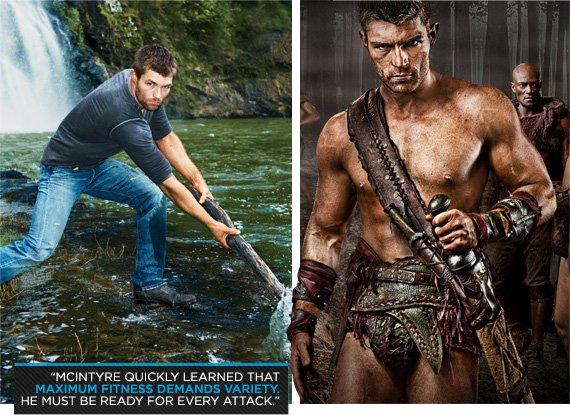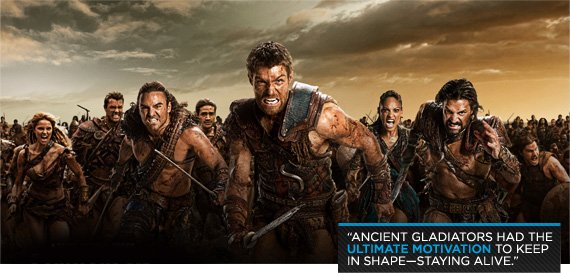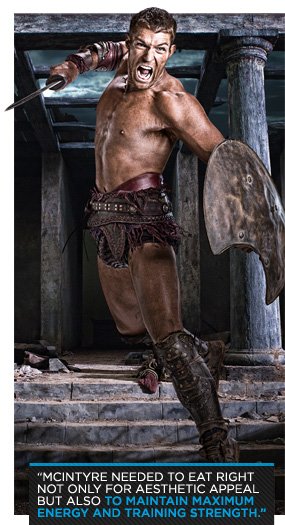Moments after he slices off a man's face, Spartacus stops amid the battle and shouts to his fellow warriors.
"Enough!" he yells. "Is this what you are? Animals?"
Some of the time, yeah—they have to be. In this violent television series with the ratcheted-up subtitles (the third season, premiering Friday, January 25, is Spartacus: War of the Damned), Spartacus must encourage a certain level of beastly brutality just so his band of rebels can survive.
As Spartacus, the Australian actor Liam McIntyre—dirtied, bloodied, steely of body and jawline—implores his men to do battle for their cause; they bang their swords against their shields in assent. It's clear he's a leader, the strongest of the strong.
As one warrior declares, "I ... follow ... Spartacus!"
Which leads to our question for you: Do you follow Spartacus?
We know you don't carry a sword or go to work nearly naked. (Please say you don't.) We mean: Is your body strong and functional so you can kick life's butt in whatever way is necessary?
In our new installment of The Spartacus Workout, we're providing you with a total-body battle plan that can lay waste to fat while building strip-to-the-waist muscle. The principles and exercises are the same ones used by McIntyre and his not-so-merry men.
McIntyre, who turned 30 last year, is in his second season as the title character. (The original Spartacus from season one, Andy Whitfield, died of cancer in 2011.) McIntyre shows a lot of skin-hence the devotion to fitness.
"As a younger actor, my motivation may have been, 'Do you want that job or don't you?'" McIntyre says. "Now it's, 'Do you want to look like crap on film?'"
Women certainly appreciate the view, but this is television made for men: Lots of fighting and other stuff that starts with f (it's premium cable, after all-the Starz network). McIntyre and his cast-mates spend much of each episode twisting, lunging, thrusting. And then there are the fight scenes: Add stabbing, swinging, and kicking.
He recalls seeing the playback of a scene in which he astounded himself with a two-legged leap. "That's why we do such a full-body regimen," he says.
To prepare for shooting, McIntyre and the cast went through a "gladiator boot camp"—several weeks of overall fitness and conditioning workouts, along with training in the skills they would need on set. (During the season, because of the long days of shooting, McIntyre's workouts focus more on strength and size than on conditioning.)
Gladiator Interview!
Watch The Video - 17:13
"At first we needed to get up to speed with fighting ability, gymnastics, and body coordination," says Tyrone Bell, a stunt performer for the show and McIntyre's personal trainer. All of that training changed McIntyre's physique, which took some getting used to.
"Now he's learned his body," Bell says. "He knows his body, and he's growing, he's agile, he's got it down pat. When last season finished up, he continued to work in the off-season, and he came back all ready—and definitely one of our fittest guys."
Bell says McIntyre's attitude helps: "He's very, very competitive. Whatever I lift, he attempts to lift," says Bell, who is also the head trainer and nutrition consultant for the entire cast. "He won't back down from anything."
Which is a good thing, being that Spartacus is the leader of a rebellion and all.
When the producers of the show first saw McIntyre, he had dropped a lot of weight for a previous film role. Still, they plucked him from the relative obscurity of mostly Australian TV and movies before they started shooting the second season, Spartacus: Vengeance.
Then they immediately sent him to the gym.

McIntyre quickly learned that maximum fitness demands variety—challenging, changing workouts—plus a small arsenal of equipment. McIntyre and the cast would do circuits, throw medicine balls, hoist sledgehammers, flip tires. Sometimes they'd do a downward progression, taking a circuit of exercises and doing 10 reps of each, down to 9, then 8, all the way to 1, and then finishing the final round with 10 reps of each.
And sometimes, they would do Dirty 30s.
A Dirty 30, to hear McIntyre describe it, is half an hour of hell, divided into three 10-minute segments, punctuated with nausea and ending in exhaustion.
But it's worth it, he says.
For their Dirty 30s, the group would perform three exercises that worked different muscles and movement patterns (for example, weighted pushups, situps with a medicine ball, and a weighted sled pull). They were assigned a goal number of repetitions they would need to complete within 1 minute, and they attempted to reach that 1-minute goal for every minute of the 10-minute segment.
If they completed the goal before the minute was up, they earned a rest. If they didn't hit it, those reps accumulated, and they'd have to finish all the extra reps at the end. Three moves, 10 minutes each. Dirty.
"As the minutes pass, you get less and less rest because you're not finishing the reps in the minute, and you feel like throwing up," McIntyre says.
But you hang tough, motivated by your mates—and by the reward.
"Afterward you feel exhausted," he says, "but you take 30 minutes to recover and you feel like your body is changing in front of you. That's a full workout—it sucks the life out of you and you feel as if you're on top of the world. You feel yourself growing stronger and stronger."

In the story of Spartacus, it's the rebels versus the Romans, which means plenty of battles (the competition) and teamwork (the camaraderie). McIntyre and the group simulate that competition and community with a workout called the Circle of Death. (While our workout is geared toward individuals, you can also mix this into your workout routine if you train with a group.)
Here's how it works: A man stands in one spot, and the others in the group form a circle around him. The man in the middle performs one move (say, throwing a heavy medicine ball to each person in the circle and doing a burpee with a pushup between throws). At the same time, the people in the circle also work around him (say, passing a heavy sandbag from man to man around the circle or moving another medicine ball in and out of legs before passing it along the perimeter).
The point is that the person in the middle is working constantly while the rest work on coordination and strength. When the middle man finishes his round, he steps out and the next man steps in.
"The first time I did it, it was, 'What have I signed up for?'" McIntyre says. "But it's really fun, really intense—I really love team exercise. When you're training hard, the more's the merrier in a big circuit session. It's really motivating. This season I'm training with my mortal enemy, Marcus Crassus. It's cool because you're out to beat the other guy but also support him. You desperately want to do better than him, so it's a positive competition."
Real gladiators were big, well-fed men, says Barry Strauss, Ph.D., a professor of history and classics at Cornell and author of The Spartacus War. "They looked a little like sumo wrestlers with spare tires. One guess is that the girth protected them from wounds," he says.
There are no gladiator guts on Spartacus, but these televised warriors have a philosophy similar to that of the ancients: Nutrition rules, whatever your training. To maintain his body, McIntyre eats a bowl of oats with protein powder for breakfast; other meals focus on lean protein (chicken or fish) and vegetables, and maybe some good carbs like a sweet potato or whole-grain rice. "Rinse and repeat," he says.
Once a week, McIntyre takes 2 hours to eat whatever he wants.

"You say, 'To hell with it' and cheat, but then you try to fight vomiting—and you realize why you cheat only once a week. It's not a cheat day; it's 2 hours where I can have as many calories as I want," McIntyre says. "I'll have pizza, maybe a burger. My girlfriend likes baking, so every Friday I have cheesecake waiting for me during those 2 hours."
Between seasons, McIntyre had a few months during which he could've let his nutrition go before ramping up for preseason training. Didn't happen.
"The funny thing is that I tried to let it go, but I felt awful, absolutely horrible. The old me wanted to eat badly, but that didn't last long," McIntyre says. He needed to eat right not only for aesthetic appeal but also to maintain maximum energy and training strength—and for handling the demands of fight scenes.
"If your nutrition isn't on," Bell says, "you're going to break, and that's the honest truth."
Ancient gladiators had the ultimate motivation to keep in shape—staying alive. McIntyre has a similar philosophy, though the stakes aren't quite as high.
"I've always been stubborn. I don't like losing. I don't like failing at anything. So the job at hand, you find a way to do it. "The key to motivation," he says, "is the people around you."
The final season, Spartacus: War of the Damned, premieres January 25, 2013, at 9 p.m. EST.


